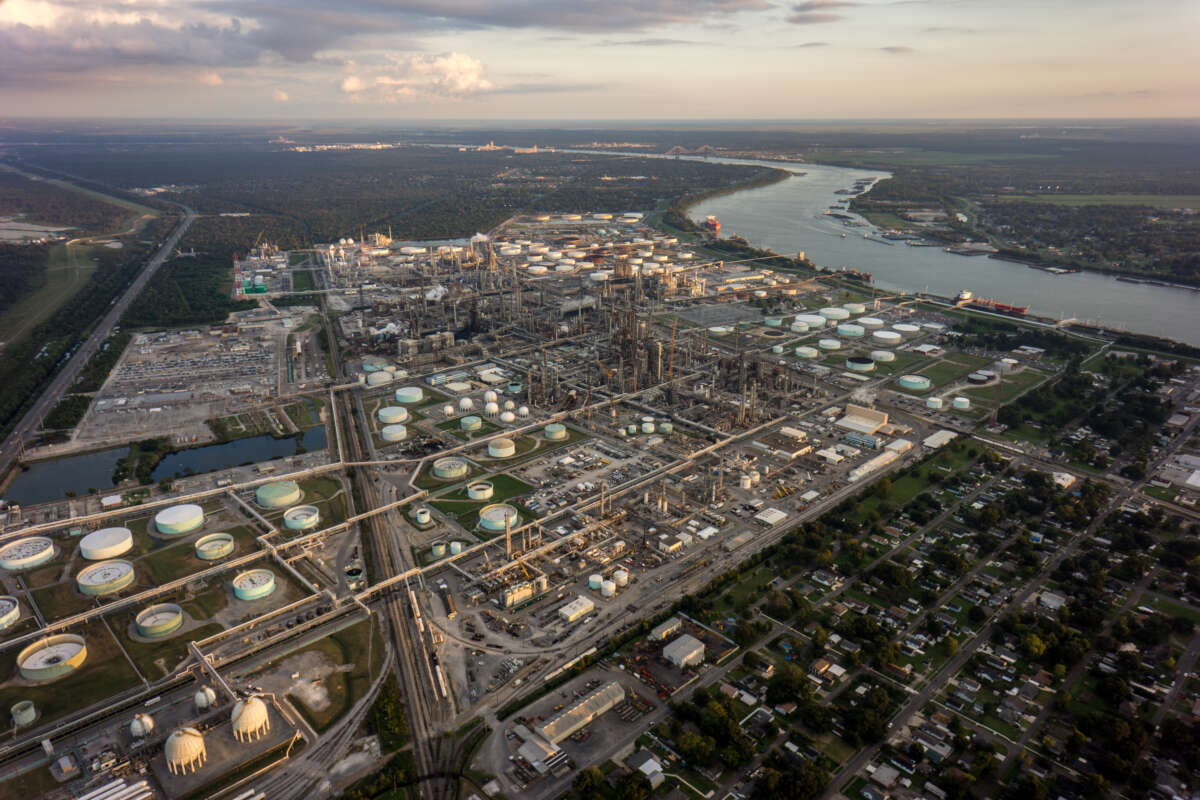Did you know that Truthout is a nonprofit and independently funded by readers like you? If you value what we do, please support our work with a donation.
A mandatory evacuation was ordered for thousands of people living within a two-mile radius of a Marathon Petroleum refinery in Louisiana’s so-called “Cancer Alley” after a chemical leak and massive fire broke out at a storage tank there on Friday.
The temporary evacuation order, which Marathon Petroleum called “precautionary,” followed a leak of naphtha — a hazardous and highly flammable liquid hydrocarbon mixture — and blaze at the refinery in Garyville in St. John the Baptist Parish, located about 45 miles upriver from New Orleans.
About 8,660 people live within two miles of the refinery, according to Nola.com. One of them, 42-year-old Lashonda Melancon, said she was trying to figure out where to go with her 14-year-old daughter.
“I’ve got asthma bad and this is not good for me,” she said.
People living near the refinery said flames could be seen dozens of feet in the air. The smoke plume from the disaster was visible from outer space.
Marathon Petroleum said in a statement: “The release and fire are contained within the refinery’s property and there have been no injuries. As a precaution, air monitoring has been deployed in the community. No off-site impacts have been detected. All regulatory notifications have been made.”
However, contained does not mean controlled — the latter means extinguished — and Marathon Petroleum spokesperson Justin Lawrence said the company did not know when the blaze would be put out.
Operational since 1977, the 200,000-barrel-per-day facility is the newest oil refinery in the United States. Marathon Petroleum’s three biggest shareholders are the Vanguard Group, SSgA Funds Management, and Blackrock, private equity firms that have come under fire for financing fossil fuel expansion during a worsening climate emergency.
In May, Reuters reported there had been 13 U.S. refinery fires in 2023, the majority of them along the Gulf Coast.
St. John the Baptist Parish is located in what’s known as Cancer Alley or Death Alley, a swath of predominantly Black parishes — the Louisiana equivalent of counties — between New Orleans and Baton Rouge containing nearly 150 oil refineries and plastics and chemical plants, many of them located along or near the Mississippi River.
In neighboring St. James Parish, the U.S. Environmental Protection Agency has reported an 800 percent cancer hazard increase due to petrochemical facilities in the parish between 2007 and 2018.
The area is also known as a “sacrifice zone,” or place where polluting industrial facilities are built in close proximity to residents — usually people of color or those with low income.
Responding to the disaster, Antonia Juhasz, senior fossil fuel researcher at Human Rights Watch, wrote on the social platform formerly known as Twitter that “such events are an all-too-common and exceptionally dangerous reality for those living within fossil fuel and petrochemical ‘sacrifice zones.'”
Anne Rolfes, executive director of the Louisiana Bucket Brigade, a frontline community advocacy group, said in a statement that “the petrochemical industry is here in Louisiana for one reason only: To make as much money as possible.”
“As long as the state of Louisiana continues to look away from fires and mushroom clouds, these accidents will continue,” she continued. “I have been dealing with this for nearly a quarter of a century. There are terrible accidents, workers are burned alive, and the state of Louisiana does nothing.”
“Workers and residents are left to bear the brunt of the industry’s negligence and predatory expansion that continue to jeopardize our health and safety,” Rolfes added.
A terrifying moment. We appeal for your support.
In the last weeks, we have witnessed an authoritarian assault on communities in Minnesota and across the nation.
The need for truthful, grassroots reporting is urgent at this cataclysmic historical moment. Yet, Trump-aligned billionaires and other allies have taken over many legacy media outlets — the culmination of a decades-long campaign to place control of the narrative into the hands of the political right.
We refuse to let Trump’s blatant propaganda machine go unchecked. Untethered to corporate ownership or advertisers, Truthout remains fearless in our reporting and our determination to use journalism as a tool for justice.
But we need your help just to fund our basic expenses. Over 80 percent of Truthout’s funding comes from small individual donations from our community of readers, and over a third of our total budget is supported by recurring monthly donors.
Truthout has launched a fundraiser to add 500 new monthly donors in the next 9 days. Whether you can make a small monthly donation or a larger one-time gift, Truthout only works with your support.
